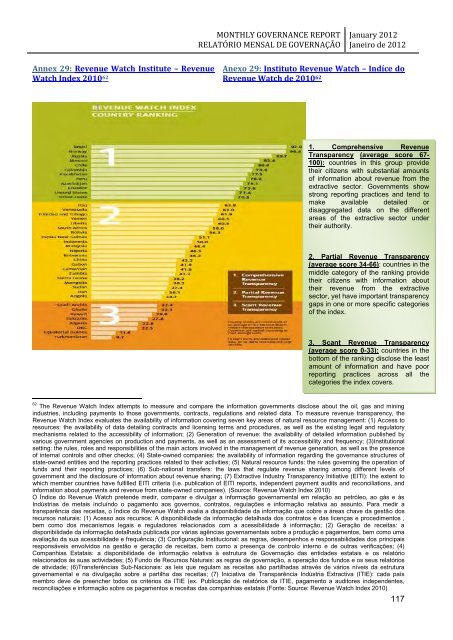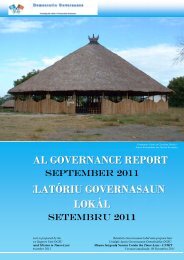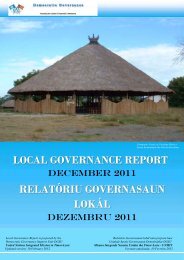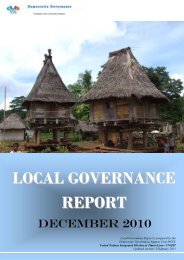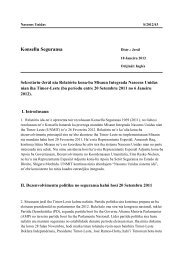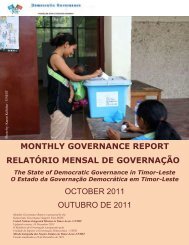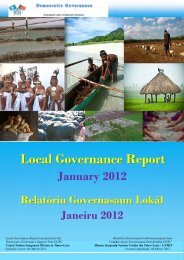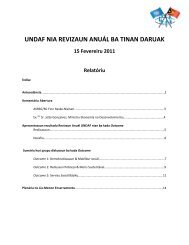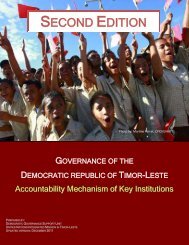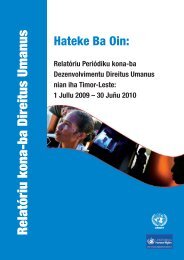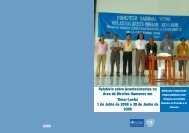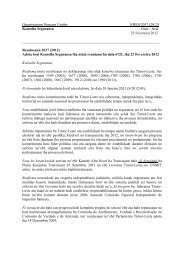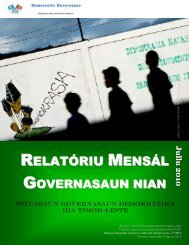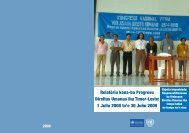monthly governance report relatório mensal de governação - Unmit
monthly governance report relatório mensal de governação - Unmit
monthly governance report relatório mensal de governação - Unmit
You also want an ePaper? Increase the reach of your titles
YUMPU automatically turns print PDFs into web optimized ePapers that Google loves.
Annex 29: Revenue Watch Institute – Revenue<br />
Watch In<strong>de</strong>x 2010 62<br />
MONTHLY GOVERNANCE REPORT<br />
RELATÓRIO MENSAL DE GOVERNAÇÃO<br />
January 2012<br />
Janeiro <strong>de</strong> 2012<br />
Anexo 29: Instituto Revenue Watch – Indíce do<br />
Revenue Watch <strong>de</strong> 2010 62<br />
1. Comprehensive Revenue<br />
Transparency (average score 67-<br />
100): countries in this group provi<strong>de</strong><br />
their citizens with substantial amounts<br />
of information about revenue from the<br />
extractive sector. Governments show<br />
strong <strong>report</strong>ing practices and tend to<br />
make available <strong>de</strong>tailed or<br />
disaggregated data on the different<br />
areas of the extractive sector un<strong>de</strong>r<br />
their authority.<br />
2. Partial Revenue Transparency<br />
(average score 34-66): countries in the<br />
middle category of the ranking provi<strong>de</strong><br />
their citizens with information about<br />
their revenue from the extractive<br />
sector, yet have important transparency<br />
gaps in one or more specific categories<br />
of the in<strong>de</strong>x.<br />
3. Scant Revenue Transparency<br />
(average score 0-33): countries in the<br />
bottom of the ranking disclose the least<br />
amount of information and have poor<br />
<strong>report</strong>ing practices across all the<br />
categories the in<strong>de</strong>x covers.<br />
62 The Revenue Watch In<strong>de</strong>x attempts to measure and compare the information governments disclose about the oil, gas and mining<br />
industries, including payments to those governments, contracts, regulations and related data. To measure revenue transparency, the<br />
Revenue Watch In<strong>de</strong>x evaluates the availability of information covering seven key areas of natural resource management: (1) Access to<br />
resources: the availability of data <strong>de</strong>tailing contracts and licensing terms and procedures, as well as the existing legal and regulatory<br />
mechanisms related to the accessibility of information; (2) Generation of revenue: the availability of <strong>de</strong>tailed information published by<br />
various government agencies on production and payments, as well as an assessment of its accessibility and frequency; (3)Institutional<br />
setting: the rules, roles and responsibilities of the main actors involved in the management of revenue generation, as well as the presence<br />
of internal controls and other checks; (4) State-owned companies: the availability of information regarding the <strong>governance</strong> structures of<br />
state-owned entities and the <strong>report</strong>ing practices related to their activities; (5) Natural resource funds: the rules governing the operation of<br />
funds and their <strong>report</strong>ing practices; (6) Sub-national transfers: the laws that regulate revenue sharing among different levels of<br />
government and the disclosure of information about revenue sharing; (7) Extractive Industry Transparency Initiative (EITI): the extent to<br />
which member countries have fulfilled EITI criteria (i.e. publication of EITI <strong>report</strong>s, in<strong>de</strong>pen<strong>de</strong>nt payment audits and reconciliations, and<br />
information about payments and revenue from state-owned companies). (Source: Revenue Watch In<strong>de</strong>x 2010)<br />
O Índice do Revenue Watch preten<strong>de</strong> medir, comparar e divulgar a informação governamental em relação ao petróleo, ao gás e às<br />
Indústrias <strong>de</strong> metais incluíndo o pagamento aos governos, contratos, regulações e informação relativa ao assunto. Para medir a<br />
transparência das receitas, o Índice do Revenue Watch avalia a disponibilida<strong>de</strong> da informação que cobre a áreas chave da gestão dos<br />
recursos naturais: (1) Acesso aos recursos: A disponibilida<strong>de</strong> da informação <strong>de</strong>talhada dos contratos e das licenças e procedimentos ,<br />
bem como dos mecanismos legais e reguladores relacionados com a acessibilida<strong>de</strong> à informação; (2) Geração <strong>de</strong> receitas: a<br />
disponibilida<strong>de</strong> da informação <strong>de</strong>talhada publicada por várias agências governamentais sobre a produção e pagamentos, bem como uma<br />
avaliação da sua acessibilida<strong>de</strong> e frequência; (3) Configuração Institucional: as regras, <strong>de</strong>sempenhos e responsabilida<strong>de</strong>s dos principais<br />
responsáveis envolvidos na gestão e geração <strong>de</strong> receitas, bem como a presença <strong>de</strong> controlo interno e <strong>de</strong> outras verificações; (4)<br />
Companhias Estatais: a disponibilida<strong>de</strong> <strong>de</strong> informação relativa à estrutura <strong>de</strong> Governação das entida<strong>de</strong>s estatais e os <strong>relatório</strong><br />
relacionados às suas activida<strong>de</strong>s; (5) Fundo <strong>de</strong> Recursos Naturais: as regras <strong>de</strong> <strong>governação</strong>, a operação dos fundos e os seus <strong>relatório</strong>s<br />
<strong>de</strong> ativida<strong>de</strong>; (6)Transferências Sub-Nacionais: as leis que regulam as receitas são partilhadas através <strong>de</strong> vários níveis da estrutura<br />
governamental e na divulgação sobre a partilha das receitas; (7) Iniciativa <strong>de</strong> Transparência Indústria Extractiva (ITIE): cada país<br />
membro <strong>de</strong>ve <strong>de</strong> preencher todos os critérios da ITIE (ex. Publicação <strong>de</strong> <strong>relatório</strong>s da ITIE, pagamento a auditores in<strong>de</strong>pen<strong>de</strong>ntes,<br />
reconciliações e informação sobre os pagamentos e receitas das companhias estatais (Fonte: Source: Revenue Watch In<strong>de</strong>x 2010)<br />
117


